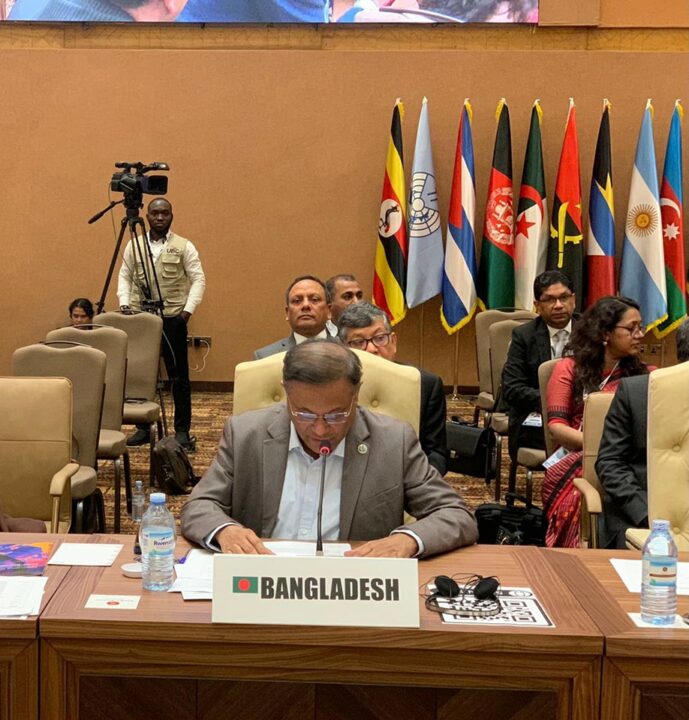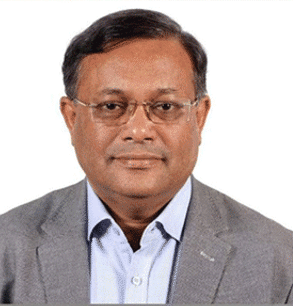Mr. Chairman,
Your Majesties,
Excellencies, Heads of State and Government,
Distinguished guests,
Ladies and gentlemen,
Assalamu Alaikum and good morning.
On behalf of Hon’ble Prime Minister Sheikh Hasina and the people of Bangladesh, I congratulate the Republic of Uganda for assuming the NAM Chairmanship. I assure Bangladesh’s full support and cooperation to His Excellency, Yoweri Kaguta Museveni (ইয়োএরি কাগুতা মুস্যোভেনি), in this esteemed role.
Our deep gratitude to the Republic of Uganda for the warm hospitality!
I commend the exceptional leadership of the Republic of Azerbaijan for skillfully guiding the Movement during its Chairmanship.
I also take this opportunity to extend warm welcome to South Sudan as the newest member of the Movement.
Mr. Chairman,
In 1973, as we joined this Movement for the first time as a sovereign country, our Father of the Nation Bangabandhu Sheikh Mujibur Rahman said, and I quote, “The world is divided into two halves, the oppressed and the oppressors and I am with the oppressed”.
Fifty years have passed, and we still live in a world beset with divisions and injustice. Climate change, frequent disasters and asymmetric advancements in technologies are causing grave dangers to humanity, especially to the developing countries.
In the absence of strong political will to exhaust peaceful means to settle disputes, the world has witnessed wars, rise of geo-political tension and unilateral coercive measures that led to global food and energy crises. This has negatively impacted on our economies in terms of inflation and price hikes.
At this critical juncture, I reiterate Bangladesh’s firm resolve to stand for those who are oppressed and those who stand by them in their just struggle.
Mr. Chairman,
Our Father of the Nation’s dictum ‘Friendship to all and malice towards none’ has set the foundation of our foreign policy.
To mark his Birth Centenary and the Golden Jubilee of our Independence, we hosted a two-day World Peace Conference in 2021. The Dhaka Peace Declaration renewed the calls for ideals of peace and non-violence.
Hon’ble Prime Minister Sheikh Hasina, the political successor of Bangabandhu, is carrying forward his legacy of peace, development and human rights with courage and determination.
During the successive governments of Prime Minister Sheikh Hasina in the last one and a half decade, we maintained a steady GDP growth of over 6%. Per capita income increased by more than five times since 2009 and the rate of poverty reduced to less than half.
Mr. Chairman,
Our commitment to the promotion and protection of human rights is fundamental to our State Principles. We underscore the need for a constructive and non-confrontational dialogue approach to promote human rights and urge the global community to place equal weight to all human rights including right to development to build peaceful, just and inclusive societies.
Only two weeks ago, we had free, fair, credible, and peaceful national elections in Bangladesh with spontaneous participation of people marking a significant milestone in our nation’s democratic journey. We value the interests and engagements of our friends and partners, and, at this vital moment, our government commits to continue to collaborate with all in advancing democratic values and ideals.
Mr. Chairman,
At the international level, our government is committed to uphold multilateralism and playing a greater role in fulfilling the goals of the Movement.
Allow me to share a few thoughts:
First:
The Movement has made great strides in supporting people’s aspiration for freedom and helped countries in Asia and Africa gain independence. Unfortunately, our brothers and sisters of Palestine have not been fortunate enough and their legitimate demand for self-determination remains unmet.
We must stand with Palestinians and use all tools available to support their cause. We commend South Africa for its initiative to hold Israel accountable under the 1948 Genocide Convention. We are pleased to have announced our intention to intervene in due course. We also call upon the International Criminal Court to expedite its investigation against Israel.
We must also redouble our efforts to secure a lasting and permanent solution to the sufferings of the Palestinians through establishment of a sovereign and independent Palestinian State along pre-1967 borders, with East Jerusalem as its capital.
Second:
The Movement needs to equip itself to tackle the non-traditional threats to peace and stability. The World Economic Forum’s latest Global Risks Report for 2024 says the biggest short-term risk stems from misinformation and disinformation, particularly in the context of emerging digital technologies. The impact of these, coupled with hatred, intolerance, xenophobia and islamophobia is far-reaching.
Climate related threats are at the top of long-term risks for global population. Having little to no contribution to global warming, countries like Bangladesh are heavily suffering from the devastating impacts of climate change.
Health emergencies, like the COVID-19 pandemic, can easily dismantle the entire global architecture of peace and development. We welcome the initiatives of the Task Force of the NAM Contact Group in response to COVID-19.
Third:
The rising number of displaced populations, especially due to armed conflicts, constitutes any major non-traditional threat to peace. Bangladesh is currently hosting 1.2 million Rohingya people forcibly displaced from Myanmar. Six years have passed, not a single Rohingya so far has returned due to lack of conducive environment in Myanmar. This has evolved as a great challenge not only for us but also the whole region.
Fourth:
To promote an environment of peace, the Movement needs to prioritize the economic dimension of it. The current global economic situation shows rapid deterioration, leading to formidable problems of poverty, hunger, illiteracy, disease and unemployment. Trade barriers, undue restrictions, and debt have left us in a cycle of underdevelopment.
We must harness the potential of human capital; share our resources, our knowledge and experience. At the multilateral level, the Movement needs to leverage the progress made in conceptualization of ‘right to development’.
Finally:
The Movement needs to invest in addressing emerging issues that will affect our future generations. We believe the upcoming United Nations Summit of the Future offers an opportunity to the Movement to exert its influence in shaping the agenda for the future.
Bangladesh as the coordinator of NAM caucus on Peacebuilding and as a top troop contributor to UN peacekeeping considers this an opportunity to improve the peace and security architecture of the United Nations.
We would urge all members of the Movement to participate in the intergovernmental negotiations for the Pact for the Future and contribute to advancing mechanisms aimed at conflict prevention and peaceful settlement of disputes, including through promotion of a culture of peace.
Mr. Chairman,
Before I conclude allow me to quote from Bangabandhu’s maiden statement in NAM – “The tasks before us are not easy… But this battle has to be fought. Peace, freedom and emancipation from exploitation have to be won.”
I thank you all.
Joi Bangla, Joi Bangabandhu
May Bangladesh Live-Forever.


